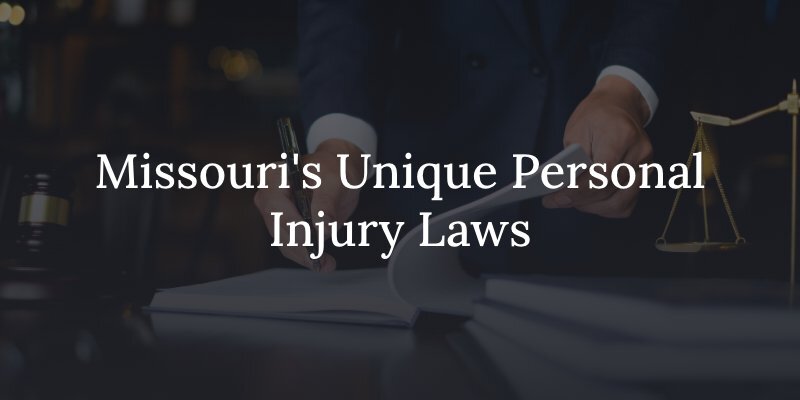Like all states, Missouri’s Civil Courts offer a means of redress and financial accountability to victims of serious personal injuries. When an individual suffers a preventable injury, it’s typically due to another party’s negligent actions. Specific statutes and other components of personal injury laws in each state vary. Missouri’s personal injury laws share common tenants with other states but also have some components that are unique to the state. For an expert who knows how to navigate these laws, contact our St. Louis personal injury attorney.

Negligence in Missouri Personal Injury Law
Like most states, injury claims in Missouri center around negligence. Recovering compensation after an injury requires the injury victim (plaintiff) to prove the at-fault party’s (defendant’s) liability by showing that their negligent actions caused injury and damages to the victim. Proving negligent liability in Missouri means the plaintiff must demonstrate the following:
- The at-fault party owed a duty of care to take reasonable measures to prevent causing injury
- They breached this duty of care through negligence, recklessness, or wrongdoing
- Their breach of duty caused an injury
- The injury victim suffered economic and non-economic damages
Economic damages in Missouri personal injury cases include medical expenses and lost income, while non-economic damages include pain and suffering and often other damages like diminished quality of life or emotional trauma.
What Is Pure Comparative Negligence in Missouri?
In Missouri, even if you contributed to the cause of your injury, you can still recover a portion of your damages. Missouri is one of only a small handful of states with pure comparison negligence insurance laws for personal injuries. Technically, even if you were 99% at fault for an accident you could recover one percent of your damages. In most cases, one party is entirely at fault or both parties could have contributed a portion of fault. For example, if another driver ran a stop sign and hit your vehicle in an intersection they may be 100% at fault for the accident, so if your damages equal $100,000, you’d recover the full amount. But what if the at-fault party’s insurance company learns that your headlights weren’t on and it was getting dark? In that case, they could assign you 50% of the fault because the other driver didn’t know you were in the intersection. You’d still recover $50,000.
While this system may benefit injury victims by allowing them to recover compensation even if they contributed to the cause of their injury, it also incentivizes insurance companies to assign a higher percentage of fault to injury victims.
It benefits most victims of personal injuries to hire an attorney to protect against this and other insurance company tactics used to protect their profits at the victim’s expense.
Missouri’s Generous Statute of Limitations on Personal Injury Lawsuits
All states place time limits on those seeking compensation through a personal injury claim. Most injury victims seek compensation for their damages as soon as the full scope of their costs, pain, and suffering becomes clear; however, sometimes insurance companies dispute claims, deny them, or undervalue them with inappropriately low settlement offers. In these cases, the injury victim may file a lawsuit to seek a positive jury verdict and a court award for their damages. Each state’s statute of limitations on personal injury cases allows a specific amount of time for the injury victim to file a lawsuit against the defendant. Most states allow two or three years to file a lawsuit, but Missouri’s statute of limitations for personal injury lawsuits is a generous five years from the date the injury occurred.
If the injury occurred while the victim was a minor, they have up to five years after their 18th birthday to file a lawsuit.
Statutes of limitations on personal injury lawsuits help to ensure that evidence is still available when a case goes to court and that eyewitness testimony remains reliable. It also protects defendants against the long-term threat of a lawsuit.
Over 93% of personal injury cases are resolved through settlements well within the state’s five-year time limit, so victims don’t often have to go to court. The generous statute of limitations allows room for negotiations toward the largest possible settlement before resorting to litigation in court.
Missouri Does Not Cap Most Non-economic Damages
Personal injury claims typically include requests for compensation for two types of damages, economic and non-economic. In some cases, injury victims also seek punitive damages. Missouri has never capped economic damages. These are damages that are easy to calculate because they are tangible consequences of an injury such as the victim’s hospital bills, medical expenses, and lost income.
For years, Missouri had caps (limits) on non-economic damages like pain and suffering, emotional grief and anguish, or disfigurement, scarring, and loss of one of the senses. Then in 2012, the Missouri Supreme Court ruled caps on non-economic damages unconstitutional. Although non-economic damages cannot be tallied like medical costs, they are often the most harmful part of the injury to the victim.
Non-economic damages are only capped in medical malpractice cases, limiting this compensation to $450,000 in most cases or up to $736,310 for catastrophic injuries like traumatic brain injuries or spinal cord damage. These caps are adjusted upward by 1.7% every year.
Caps also limit non-economic damages when the defendant is a Missouri government entity.
Missouri caps punitive damages at $500,000. Punitive damages are awarded to victims not as compensation but as a punishment and deterrent to the wrongdoer when their egregious actions result in severe injury to someone else.
Missouri Allows Family Members to Directly Claim Wrongful Death
All states allow surviving family members to make wrongful death claims when a loved one dies due to someone else’s negligent or wrongful actions; however, many states do not allow a spouse, parent, or adult child to file a wrongful death claim for compensation directly. Some states require a personal representative of the family such as the executor of the defendant’s estate plan or will, or a representative appointed by the court to file the claim. After they recover a settlement or jury award for wrongful death, the representative distributes the compensation to the closest family members.
In Missouri, grieving family members such as a spouse, parent, or adult child may file wrongful death claims against an at-fault party directly rather than through a personal representative. Contact our St. Louis wrongful death lawyer for assistance.

